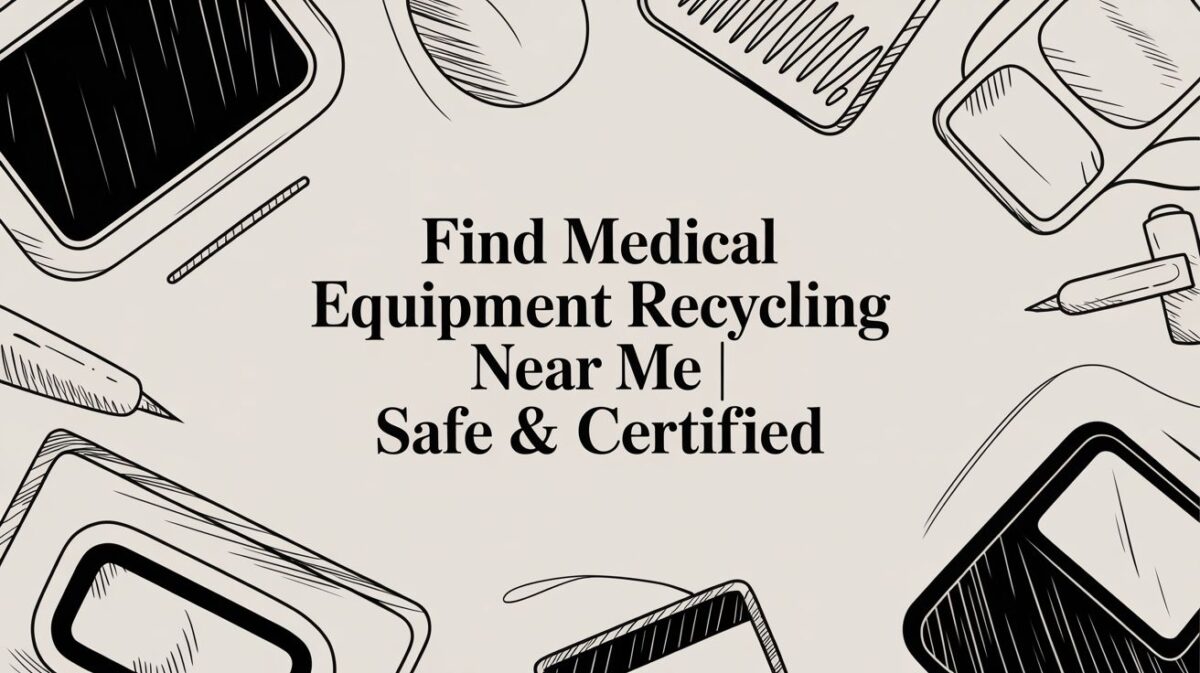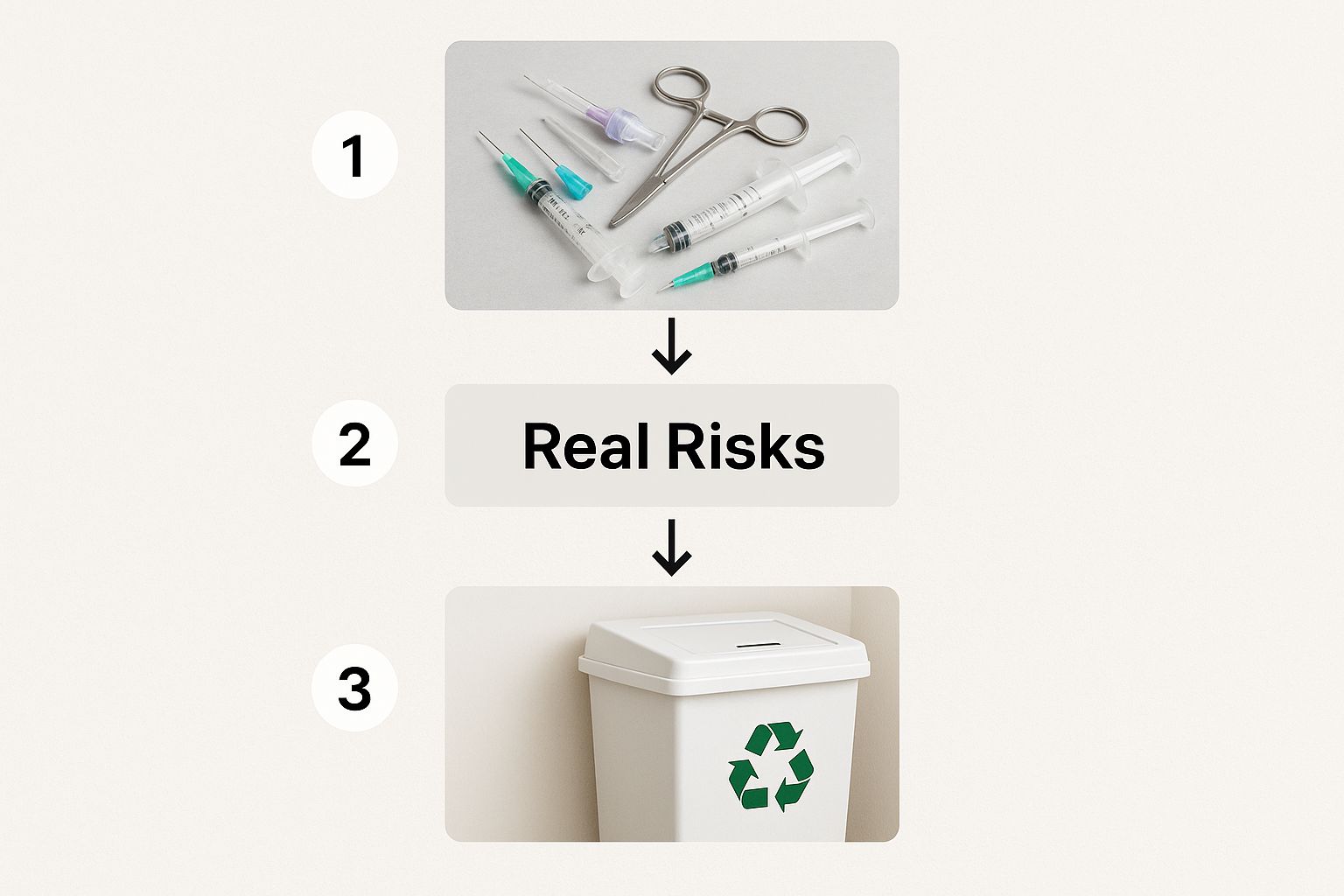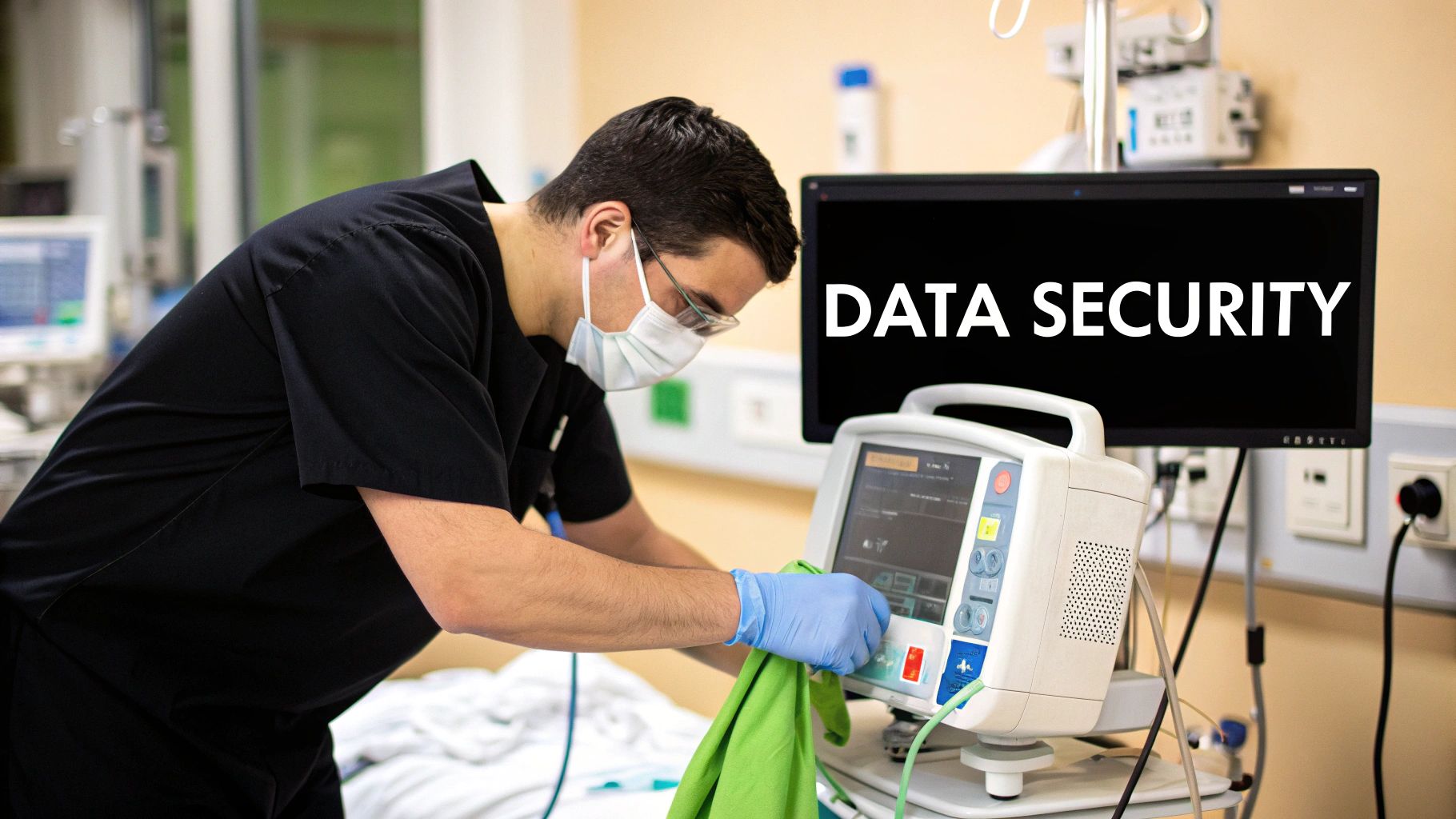Find Medical Equipment Recycling Near Me | Safe, Certified & Mission-Driven

If you’ve found yourself searching for "medical equipment recycling near me," you already know this isn't as simple as hauling old office furniture to the dump. The short answer? You absolutely need to partner with a certified, specialist recycler. It’s the only real way to safeguard patient data, protect the environment, and keep your facility compliant.
Let’s be clear: improper disposal isn't just a minor mistake. It's a massive business risk with some seriously painful consequences.
The Real Risks of Improper Medical Equipment Disposal
Tossing old medical devices into a standard dumpster or handing them off to a general scrap hauler is a high-stakes gamble. The fallout goes way beyond a simple fine, hitting every part of your healthcare facility’s operations—from your legal standing all the way to public trust. This isn’t just about clearing out old machines; it's a critical decision that directly impacts your reputation and financial stability.
The legal and financial penalties alone can be staggering. We've seen non-compliance with HIPAA lead to fines that stretch into the millions, all stemming from data breaches on discarded equipment. And that’s just the data side. Environmental regulations are just as strict, governing how you dispose of e-waste that often contains hazardous materials like lead and mercury.
Environmental and Compliance Burdens
The sheer volume of electronic waste is a global headache, and the medical field is a major contributor. The global medical device recycling service market is booming, expected to hit approximately $3.06 billion by 2025. This explosive growth is a direct result of tougher regulations and a much-needed increase in environmental awareness.
When devices are discarded improperly, they add to a huge environmental problem. You can get a deeper understanding of how e-waste impacts health and the environment in our detailed guide. This makes finding a responsible partner a non-negotiable part of your corporate social responsibility.
Choosing the right partner transforms a necessary chore into a strategic advantage. It protects your facility from liability while reinforcing your commitment to patient privacy and environmental stewardship.
To make this process easier, we've put together a quick checklist of the essentials. Think of these as the non-negotiables when you're vetting a potential partner.
Essential Criteria for Your Recycling Partner
| Evaluation Criteria | Why It Matters | A Major Red Flag |
|---|---|---|
| Industry Certifications | Certs like R2 or e-Stewards are proof of adherence to strict environmental and data security standards. | Vague claims of being "green" or "eco-friendly" with no certifications to back them up. |
| HIPAA Compliance | The recycler must have documented, auditable processes for secure data destruction to protect patient PHI. | They can't provide a Certificate of Data Destruction for every single device they process. |
| Specialized Experience | Medical equipment contains unique materials and data risks. A general e-waste recycler may not be equipped to handle them. | Their primary business is scrap metal or general commercial waste, not specialized electronics. |
| Transparent Chain of Custody | You need to know where your assets are at all times, from pickup to final destruction, with clear documentation. | They are unwilling or unable to provide detailed tracking reports and a clear paper trail. |
Looking at this table, it's clear that the stakes are too high for guesswork. You need a partner who ticks every single one of these boxes, without exception.
Visualizing the Stakes
This infographic really drives home the critical choice between improper disposal and secure, certified recycling.
The image puts the chaos of a landfill right next to the order of a secure process, underscoring just how serious the risks are. It’s a powerful reminder of what’s at stake.
How to Find and Vet Certified Local Recyclers
Finding a truly qualified partner for your medical equipment recycling means looking beyond a quick "medical equipment recycling near me" search. While that's a decent starting point, the real gems are often found in more specialized places.
I always recommend starting with municipal and county waste management portals. These government sites usually keep updated lists of approved or licensed e-waste handlers in the area. Another great resource? Healthcare administration forums and industry association websites. You can often find candid recommendations from peers who have already done the legwork, which is invaluable.
Distinguishing Professionals from General Haulers
Once you have a shortlist, the real work begins: separating the specialized, compliant pros from the general scrap haulers. This is a critical distinction. A general hauler will take your equipment, sure, but they almost certainly won't provide the documentation or guarantee the data security your facility is legally required to have.
The vetting process is your best defense against massive compliance headaches down the road. It all comes down to asking direct, pointed questions that force them to prove they meet industry standards. A true professional will not only expect this level of scrutiny—they'll welcome it and have all their answers and documents ready to go.
A reputable partner’s process should be transparent and auditable from start to finish. If a potential vendor is evasive about their certifications or chain-of-custody procedures, consider it a major red flag and move on.
Critical Questions for Potential Partners
To really get a feel for a provider's professionalism, you need to understand the nuances of proper waste handling. This a comprehensive guide to medical waste management is a great read on why professional oversight is so non-negotiable.
When you start making calls, treat this list of questions as your practical checklist:
-
"Can you provide proof of your R2 or e-Stewards certification?" These are the gold standards for a reason. They guarantee a recycler is serious about environmental responsibility and data security. Don't just take their word for it—ask for their certificate number and verify it yourself on the organization's website.
-
"What is your documented chain-of-custody process?" They need to walk you through—and show you documentation for—how they track every single asset from the moment it leaves your facility to its final disposition. This isn't a handshake deal; it requires serialized asset lists and secure, tracked transportation.
-
"How do you handle data destruction for HIPAA compliance?" Listen for specific, confident answers. You want to hear terms like physical destruction (shredding) or DoD 5220.22-M compliant data wiping. If they give you a vague, hand-wavy response, they aren't the partner for you.
-
"Will we receive a Certificate of Destruction for all data-bearing devices?" This is non-negotiable. That certificate is your legal proof that you fulfilled your data security obligations under HIPAA. If they can't provide one for every single device, walk away.
Asking these questions helps you confidently pick a partner who truly understands the high stakes involved in healthcare. When evaluating your local options, look for specialized electronic waste recycling services designed to meet these exact, rigorous standards. A certified specialist doesn't just haul away old equipment—they protect your facility’s reputation and legal standing.
Protecting Patient Data During Equipment Disposal
The moment a piece of medical equipment leaves your facility, your legal responsibility for the patient data it holds doesn't end at the loading dock. This is, without a doubt, the most critical part of the entire recycling process—one where a single misstep can spiral into devastating legal and reputational damage.
The real problem is that electronic protected health information (ePHI) lingers on a surprisingly wide range of devices.
We're not just talking about the obvious culprits like MRI machines and CT scanners with their huge imaging libraries. Patient monitors logging vital signs, infusion pumps tracking dosages, and even smaller diagnostic tools can all hold ePHI on internal hard drives and memory cards. A common—and dangerous—misconception is that a factory reset wipes the slate clean. It doesn't.
Think of a factory reset as removing the table of contents from a book. The chapters are all still there, and with basic data forensics tools, that information is easily recoverable. For true security that stands up to HIPAA scrutiny, the data can't just be hidden; it must be completely and irreversibly destroyed.
The Certificate of Destruction Is Your Legal Shield
This is where a professional, certified recycler proves their value. The only way to formally terminate your liability for patient data on a retired device is by securing a Certificate of Destruction (CoD). This isn't just a receipt; it's your legally binding proof that all data was professionally destroyed according to strict industry standards.
A legitimate CoD is your audit trail armor. It must include:
- Unique Serial Numbers: Every single data-bearing asset needs to be itemized.
- Method of Destruction: The document should clearly state the method used, whether it's physical shredding or DoD 5220.22-M compliant data wiping.
- Date of Destruction: A clear timestamp showing precisely when the data was destroyed.
- A Statement of Indemnification: A crucial clause where the recycler formally assumes liability from the moment they take possession.
Without this document, you have zero verifiable proof that you met your legal obligations. If an audit happens or a data breach is traced back to your old equipment, the absence of a CoD leaves your facility completely exposed. For a deeper dive, our guide on protecting sensitive data during electronics recycling details more specific steps for Atlanta businesses.
Your legal liability for patient data only ends when you have verifiable proof that all data has been professionally destroyed. The Certificate of Destruction is that proof.
The Growing Market and Heightened Risks
The pressure to get this right is only increasing as the industry expands. The medical waste management market, which includes equipment recycling, is on track to blow past USD 26 billion by 2034. This boom is fueled by an aging population and more medical interventions, which means more equipment cycling out of service. You can dig into more insights about this expanding market on Precedence Research.
This rapid growth also means amplified risks. It’s not hard to imagine a real-world scenario: a retired patient infusion pump gets sold on a secondary market without being properly wiped. If that device still holds logs with patient names, drug dosages, and treatment times, its discovery could easily trigger a massive HIPAA breach investigation.
The result? Severe fines and a complete loss of patient trust. Your choice of a partner for "medical equipment recycling near me" is your first and most important line of defense against this kind of disaster.
What to Expect During Pickup and Processing
So, you’ve picked a partner for your medical equipment recycling. Now what? Knowing how the process works from your loading dock to their facility takes the mystery out of it and gives you confidence you made the right choice. A professional service has a workflow designed for total security, accountability, and getting the most material back into circulation.
A seamless pickup really starts with good prep on your end. Before the truck even shows up, your team should have a solid inventory of all the assets being retired. This isn't just a simple headcount; it's a detailed list with the item type, brand, and serial number for each piece. This document is the first link in a very important chain of custody.
When pickup day arrives, expect a professional crew, not just some guy with a truck. They should come equipped with dollies, pallet jacks, and whatever else is needed to handle bulky, sensitive machinery without a scratch. Each piece of equipment should be tagged and scanned right there on-site, matching its serial number to the inventory list you prepared. It's a critical step that creates an instant digital record the moment it leaves your control.
Behind the Scenes at the Processing Facility
Once your equipment is safely on its way, it heads to a controlled-access facility where the real work begins. This process is a whole lot more involved than just tossing things into a scrapper—it’s a precise, hands-on disassembly operation.
Technicians get to work methodically taking apart every single device. Their absolute first priority is to hunt down and remove any part that could possibly hold data. We're talking hard drives, solid-state drives, memory cards, you name it. These components are immediately pulled and taken to a secure area specifically for data destruction, making sure no ePHI ever gets compromised.
At its heart, responsible medical equipment recycling is all about the careful, manual breakdown of each device. This ensures data-bearing parts are securely handled and valuable materials are properly sorted, keeping hazardous e-waste out of our landfills.
From Component to Commodity
With all data-sensitive parts removed and secured, the focus shifts to recovering materials. The remaining components are meticulously sorted into different streams:
- Circuit Boards: These are packed with precious metals like gold, silver, and palladium that can be recovered.
- Metals: The steel, aluminum, and copper from frames, wiring, and heat sinks are separated and sent off to smelters.
- Plastics: Casings and other plastic bits are shredded and granulated to be used in making new products.
- Hazardous Materials: Things like mercury switches or the leaded glass from old CRT monitors are carefully handled for specialized, compliant disposal.
This rigorous sorting process ensures that up to 98% of the material from old equipment can be reintroduced into the manufacturing supply chain. It turns a simple compliance task into a real environmental win.
When you're ready to see this process in action for your own facility, you can easily schedule a pickup with our team, and we'll handle all the logistics from there.
Turn Compliance Costs into a Powerful Brand Story
Responsible medical equipment recycling is so much more than a logistical chore or another line item in your compliance budget. It’s actually a powerful, and often overlooked, resource for building your brand’s reputation and forging a real connection with your community.
When you partner with the right mission-driven recycler, you can flip this operational cost into a strategic investment in your Environmental, Social, and Governance (ESG) and Corporate Social Responsibility (CSR) goals.
Think bigger than simple disposal. What if your retired assets did more than just get broken down? Imagine a "Recycle for a Cause" campaign where your old equipment becomes part of a larger story—one that helps support community initiatives, like providing aid to veterans or planting trees in our national forests.
This approach turns a routine task into a compelling narrative that truly resonates with employees, patients, and stakeholders.
Building Your ESG Narrative
Partnering with a recycler that offers a dual philanthropic impact gives you a ready-made solution for boosting your corporate citizenship. It lets you position your facility as an organization that cares deeply about both people and the planet.
This isn't just about feeling good; it's about generating tangible, reportable outcomes that give your sustainability reports some serious weight.
You can create powerful messaging like, “Our retired tech helps house a veteran and grow a forest.” That kind of emotional connection links the simple act of responsible recycling to tangible, positive change.
To make sure this impact is credible and transparent, you need to look for partners who can provide clear proof of their work, including:
- Impact Reports: Detailed summaries that actually quantify your contribution (e.g., "Your partnership supported 3 veterans and planted 50 trees this quarter").
- Digital Badges: A "Recycled with Purpose" certification you can proudly display on your website and in your CSR documentation.
- Co-hosted Drives: Opportunities to collaborate on recycling events with nonprofits, getting your local community directly involved.
A mission-driven recycling partnership makes your facility's ESG goals visible and verifiable. It shows a commitment that goes far beyond basic compliance, turning responsible disposal into an active contribution to social good.
Quantifying Your Impact
The demand for these specialized services is definitely on the rise. The medical waste recycling service market is projected to hit $2.24 billion by 2033, with hospitals and clinics driving much of that need.
This growth shines a spotlight on a massive opportunity for healthcare facilities to lead the way in sustainable practices. You can discover more insights about the rise of specialized medical recycling services on Archive Market Research.
By choosing a partner that quantifies your contribution, you transform abstract goals into concrete achievements. Instead of just saying your facility is "eco-friendly," you can report that your retired equipment helped reforest a specific number of acres or provided direct support to community members.
This kind of data-driven storytelling is incredibly effective. It gives your marketing and communications teams authentic, feel-good content for newsletters, social media, and annual reports. It also fosters a real sense of pride among your staff, who can see that their workplace is making a measurable difference.
Ultimately, this transforms the search for "medical equipment recycling near me" from a logistical headache into a strategic opportunity to strengthen your brand.
Questions We Hear All the Time About Medical Device Recycling
Let's be honest, figuring out the rules for medical equipment recycling can feel like wading through murky water. But once you get the hang of a few key details, the whole process becomes much clearer.
Here are some straight answers to the most common questions we get from healthcare administrators and facility managers just like you.
What Kinds of Medical Equipment Can I Actually Recycle?
A huge range of electronic medical devices are perfect candidates for recycling. We’re talking about the big stuff, like X-ray and MRI machines, but also all the various pieces of lab equipment, patient monitors, and infusion pumps that keep your facility running.
There is one major exception, though: any device that has been contaminated with biohazardous materials. These items need a specialized handling process and can't just be tossed in with standard e-waste. It's always a good idea to run your inventory list by your recycling provider beforehand to make sure they can handle everything safely and according to regulations.
What's This Going to Cost Me?
The cost of recycling medical equipment isn't a simple, one-size-fits-all number. The final price tag depends on a few different things, like the type and amount of equipment you have, where your facility is located, and how complex the job is. For example, a job that requires our team to come on-site and de-install machines will naturally have a different cost structure than a straightforward pickup from your loading dock.
Some recyclers might charge you by the pound or per device, while others could offer the service for free if you have a large volume of high-value equipment. Always, always ask for a detailed, itemized quote. This prevents any surprise fees down the road and keeps everything transparent.
What Paperwork Should I Expect to Get?
Proper documentation is the absolute cornerstone of a compliant recycling program. Think of it as your audit trail. Any reputable recycler will provide you with crucial paperwork that proves you've checked all the legal and regulatory boxes.
You should always walk away with two key documents:
- A Certificate of Destruction: This is your proof that any device containing patient data has been securely and permanently wiped clean.
- A Certificate of Recycling: This document covers every piece of equipment processed, verifying that it was all handled in an environmentally responsible way.
A detailed asset list with serial numbers is also standard practice. It creates a clear chain-of-custody record, tracking your equipment from the moment it leaves your facility to its final destination. To dig a little deeper, you can explore more answers to common questions about e-waste disposal.
Is It Better to Just Donate Old Equipment?
Donating modern, working equipment can be a fantastic way to give it a second life. We're all for it! However, this is only a smart move if the organization receiving it can give you an ironclad guarantee of complete and compliant data destruction.
For older or non-functional devices, certified recycling is hands-down the safest and most compliant route to take. The good news is that many responsible recyclers, like us, also run refurbishment programs. This gives you the best of both worlds: we can often salvage and donate viable parts after we've ensured total data security.
Ready to turn your compliance needs into a powerful story of community and environmental support? Partner with Atlanta Green Recycling. We provide certified medical equipment recycling that not only ensures data security and environmental responsibility but also supports veterans and reforestation efforts with every pickup. Schedule your professional recycling service today!


